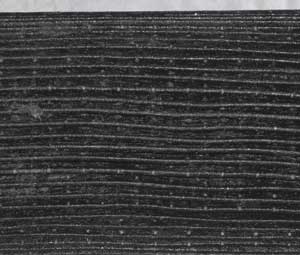Overcoming Microbiological Contamination, Material Compatibility



May 14, 2008
BY Howard Chesneau
The nation is awakening to the renewable fuels movement. While fuels such as biodiesel and ethanol have been around for more than 15 years, the real growth has been in the past five years as crude oil prices have increased and the public clamors for alternatives to foreign petroleum. However, it's important to step back and fully evaluate the rush to biofuels. While it's clear biodiesel is here to stay, any new fuel must be technologically feasible.
By definition, biodiesel is a 100 percent fatty acid methyl ester fuel. The most commonly used blends range from B2 to B20, which means anywhere from 2 percent to 20 percent biodiesel is blended in petroleum diesel. One of biodiesel's positive features is that it's biodegradable. However, in a poor environment, this can also be one of biodiesel's negative features. In this case, the enemy is Mother Nature in her simplest form of life: microorganisms that feed on straight chain fatty acids. These microorganisms have a chemical protocol that starts by trying to feed on straight-chain hydrocarbons that they have modified from the petroleum hydrocarbon to a fatty acid. If these molecules are not available, they proceed to the next molecule to try and convert it into a fatty acid. This selection process continues until the microorganisms have succeeded.
Biodiesel and its blends can provide an easier pathway for the microorganism as the fatty acid methyl ester molecule is in the final stage prior to breaking down the fuel for energy. The introduction of water into biodiesel can create an environment for a biological attack on the fuel itself.
Battling Biological Deterioration
In simple terms, biodiesel and blend components are more susceptible to biological attack than regular diesel fuel. As a result, removing water from a fuel system becomes increasingly important, a surveillance program becomes paramount and long-term storage becomes difficult. Removing the water can be an arduous task. In the worst-case scenario, it's impossible to remove entirely. This is why a surveillance program that includes quarterly or at the least semi-annually testing the fuel is highly recommended. Real-time testing of a fuel system is most effective and convenient for users. Obtaining results in 30 minutes or less, as touted by some newer technologies, allows treatment to begin immediately if necessary.
The good news is that not all is gloom and doom. A variety of low-cost field biological tests can be performed to determine if a fuel system is being degraded, and a variety of biocides can be used to combat the problem. However, water removal is another issue. Biodiesel can retain up to 20 times more water than regular diesel (1,200 parts per million compared to 60 ppm). Biological activity requires water, so water removal is the first line of defense against biological attack. One side effect of microbiological contamination is severe corrosion to the metal components of a fuel system. This is referred to as microbial influenced corrosion. Another is filter plugging, which is usually the first sign that most people see when the product is under microbial attack.
Biodiesel quality control is also critical. A National Renewable Energy Laboratory survey released at the February 2008 National Biodiesel Conference featured surveys collected from biodiesel producers between April and October 2007. In-spec samples represented 90 percent of the biodiesel produced that year, according to the results. The findings were a significant improvement from a similar study NREL conducted in 2006.
The industry has made tremendous efforts to gain greater quality control over biodiesel production by instituting programs such as BQ-9000. This voluntary quality assurance program assures that product produced under BQ-9000 accreditation is produced using ASTM-certified methods. Other steps have been taken by individual states to require certificates of analysis on product. The industry will likely see more required regulated quality assurance certifications in the future. The marketplace will demand them.
The upside to increased quality scrutiny is that as biodiesel blends become more available to the consumer-in some cases by mandate-users will become more confident that issues that initially plagued the industry will begin to fade. However, this doesn't mean all technical issues have been solved. The industry continues to face ongoing challenges, such as exposure to cold weather issues, out-of-spec fuel and the previously unrecognized phenomena that impacts new fuels. All can be resolved in time, but increased surveillance is necessary if the industry is to continue prospering. The public is fickle and doesn't like problems.
Overcoming MaterialCompatibility
Material compatibility is another issue that must be addressed when dealing with a diverse fuel infrastructure. Fuel systems handling biodiesel must be examined carefully so that material used is compatible with the fuel when it comes in contact with any wetted surface. In general, B2 to B20 blends have no real issues with seals and gaskets (see page 118), but several metals, such as yellow metals, can provide some issues. Higher concentrations of biodiesel may begin to see problems more rapidly with zinc, tin and some seals and gaskets. Regular diesel fuel also has issues with copper and zinc, and wetted surface contact should be avoided. The appendix to ASTM D 975 contains specific comments on this topic.
Heating oil systems are especially at risk without proper preparation. Almost all home heating oil systems contain copper. In fact, it is required by fire codes. However, copper is a known oxidation catalyst to fuel and heating oil, especially if the fuel is stored for six months out of the year. Additives are available to counter this problem, but they are not mandated. As biodiesel becomes more popular in home heating oil, it will become necessary for homeowners or their suppliers to be conscious of issues that may affect home heating operability.
In conclusion, buyer and supplier must be aware of fuel degradation and material compatibility with all fuels, including biodiesel. The biodiesel industry has quickly learned that and is working on solutions to ensure the continuity of the industry's growth.
Howard Chesneau is the president of Fuel Quality Services Inc. in Flowery Branch, Ga. Reach him at (800) 827-9790. For more information, visit www.fqsinc.com.
By definition, biodiesel is a 100 percent fatty acid methyl ester fuel. The most commonly used blends range from B2 to B20, which means anywhere from 2 percent to 20 percent biodiesel is blended in petroleum diesel. One of biodiesel's positive features is that it's biodegradable. However, in a poor environment, this can also be one of biodiesel's negative features. In this case, the enemy is Mother Nature in her simplest form of life: microorganisms that feed on straight chain fatty acids. These microorganisms have a chemical protocol that starts by trying to feed on straight-chain hydrocarbons that they have modified from the petroleum hydrocarbon to a fatty acid. If these molecules are not available, they proceed to the next molecule to try and convert it into a fatty acid. This selection process continues until the microorganisms have succeeded.
Biodiesel and its blends can provide an easier pathway for the microorganism as the fatty acid methyl ester molecule is in the final stage prior to breaking down the fuel for energy. The introduction of water into biodiesel can create an environment for a biological attack on the fuel itself.
Battling Biological Deterioration
In simple terms, biodiesel and blend components are more susceptible to biological attack than regular diesel fuel. As a result, removing water from a fuel system becomes increasingly important, a surveillance program becomes paramount and long-term storage becomes difficult. Removing the water can be an arduous task. In the worst-case scenario, it's impossible to remove entirely. This is why a surveillance program that includes quarterly or at the least semi-annually testing the fuel is highly recommended. Real-time testing of a fuel system is most effective and convenient for users. Obtaining results in 30 minutes or less, as touted by some newer technologies, allows treatment to begin immediately if necessary.
The good news is that not all is gloom and doom. A variety of low-cost field biological tests can be performed to determine if a fuel system is being degraded, and a variety of biocides can be used to combat the problem. However, water removal is another issue. Biodiesel can retain up to 20 times more water than regular diesel (1,200 parts per million compared to 60 ppm). Biological activity requires water, so water removal is the first line of defense against biological attack. One side effect of microbiological contamination is severe corrosion to the metal components of a fuel system. This is referred to as microbial influenced corrosion. Another is filter plugging, which is usually the first sign that most people see when the product is under microbial attack.
Biodiesel quality control is also critical. A National Renewable Energy Laboratory survey released at the February 2008 National Biodiesel Conference featured surveys collected from biodiesel producers between April and October 2007. In-spec samples represented 90 percent of the biodiesel produced that year, according to the results. The findings were a significant improvement from a similar study NREL conducted in 2006.
The industry has made tremendous efforts to gain greater quality control over biodiesel production by instituting programs such as BQ-9000. This voluntary quality assurance program assures that product produced under BQ-9000 accreditation is produced using ASTM-certified methods. Other steps have been taken by individual states to require certificates of analysis on product. The industry will likely see more required regulated quality assurance certifications in the future. The marketplace will demand them.
The upside to increased quality scrutiny is that as biodiesel blends become more available to the consumer-in some cases by mandate-users will become more confident that issues that initially plagued the industry will begin to fade. However, this doesn't mean all technical issues have been solved. The industry continues to face ongoing challenges, such as exposure to cold weather issues, out-of-spec fuel and the previously unrecognized phenomena that impacts new fuels. All can be resolved in time, but increased surveillance is necessary if the industry is to continue prospering. The public is fickle and doesn't like problems.
Overcoming MaterialCompatibility
Material compatibility is another issue that must be addressed when dealing with a diverse fuel infrastructure. Fuel systems handling biodiesel must be examined carefully so that material used is compatible with the fuel when it comes in contact with any wetted surface. In general, B2 to B20 blends have no real issues with seals and gaskets (see page 118), but several metals, such as yellow metals, can provide some issues. Higher concentrations of biodiesel may begin to see problems more rapidly with zinc, tin and some seals and gaskets. Regular diesel fuel also has issues with copper and zinc, and wetted surface contact should be avoided. The appendix to ASTM D 975 contains specific comments on this topic.
Heating oil systems are especially at risk without proper preparation. Almost all home heating oil systems contain copper. In fact, it is required by fire codes. However, copper is a known oxidation catalyst to fuel and heating oil, especially if the fuel is stored for six months out of the year. Additives are available to counter this problem, but they are not mandated. As biodiesel becomes more popular in home heating oil, it will become necessary for homeowners or their suppliers to be conscious of issues that may affect home heating operability.
In conclusion, buyer and supplier must be aware of fuel degradation and material compatibility with all fuels, including biodiesel. The biodiesel industry has quickly learned that and is working on solutions to ensure the continuity of the industry's growth.
Howard Chesneau is the president of Fuel Quality Services Inc. in Flowery Branch, Ga. Reach him at (800) 827-9790. For more information, visit www.fqsinc.com.
Advertisement
Advertisement
Advertisement
Advertisement
Upcoming Events





